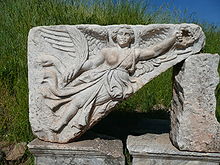It's no shock that Christianity has permeated the culture for the last fifteen-hundred years. Our laws, our holidays and our history are sealed and stamped with the influence of Christ and Judaism. Jesus isn't the only name we throw around so casually. His might be the name by which we must be saved, but we needed a few more names to fill out the calendar. I'm curious what exactly it was about each day that made the ancients think, hmm, we'll name this day such-and-such.
Do a little research (read Wikipedia) and you'll find some interesting characteristics attributed to our weekly routines. Are people more likely to drop their pants on Monday? Do we all feel a little more confrontational on Tuesday? Are eye injuries or shrewd bargains more likely on Wednesday? What about lightening strikes? Do big storms usually come on Thursdays? Of course, we've all had dates on Friday night. After a long Saturday with the children, a father just might feel like eating them all up, only to be overthrown by them later. And Sunday? Um. Actually, that one doesn't make much sense.
 |
| Cronus and the Delicious Baby by RYE BREAD of DeviantART |
Well, if you didn't look it up on Wiki and you have no clue what I'm ranting about, I'll fill you in. Every day of the week is named for a heavenly body or a god or goddess. Moon-day, Tyr's-day (Norse equivalent of Mars), Odin's-day, Thor's-day, Frige's-day (Norse equivalent of Venus), Saturn's-day and Sun-day. The months of the year work the same way. Think Julius Caesar for July and Caesar Augustus for August, two deified emperors of Rome. After August, their creativity kind of ran out because September, October, November and December are named according to the Latin numbers for seven, eight, nine, and ten respectively. Oh well. Being creative wasn't really what Rome was good at anyway.
 | |
| Nike. American Shoe of Victory |
 |
| Nike. Roman Goddess of Victory |
I like to find old names in new places and I love it when I 'get' the reference. If you think about it, you probably could name a ton of things we see everyday named after some old king or god or something. It's as common as Nike shoes.

Thanks for getting the comment stuff worked out. I share your love of finding old names in current usages. I just have one question. How did "Odin's Day" become "Wednesday"?? Phonetically, I can see the other ones becoming the current names for days of the week, but that one doesn't make much sense. And heaven forbid I should look up the Wikipedia article you referenced. :)
ReplyDeleteOdin had a bunch of variants of his name (Woden, Wotan, Votan) as well as a few other just different names. Woden's day becomes Wodenes Day becomes Wedenesday becomes Wednesday.
ReplyDeleteOnly you and Ashley would get this blog LOL love your writing wish there was more!
ReplyDeletei get the blog......... just wondering what phonetically means........ ha ha just kidding
ReplyDeleteLisa